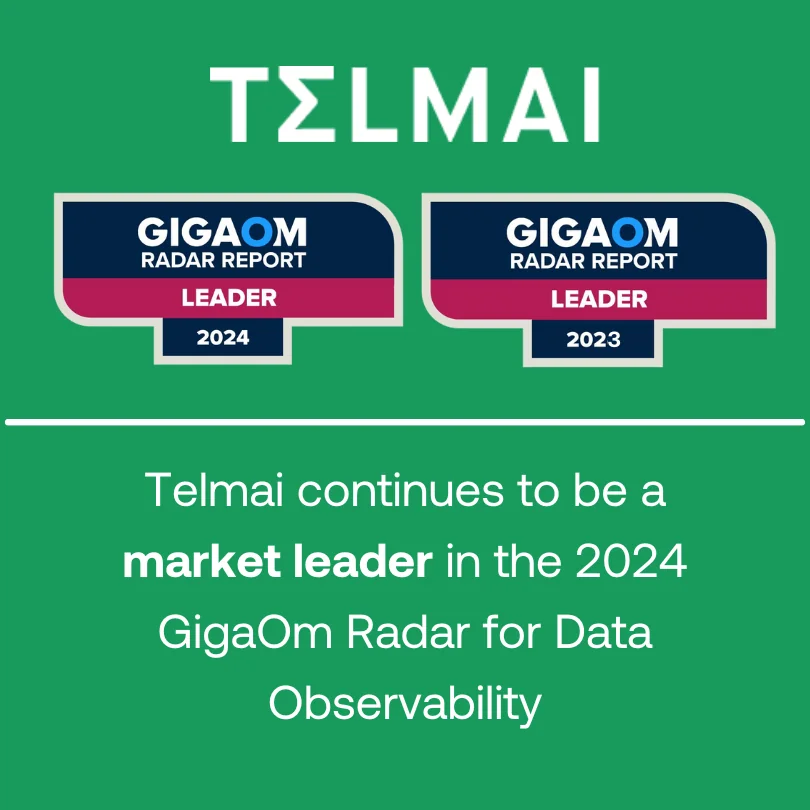A rundown of Telmai’s recent key product feature updates
Telmai’s latest product updates focus on enhancing data quality monitoring, integrating new tools, and improving usability. With streamlined workflows, stronger security, and flexible deployment options, ensuring data accuracy just got easier.
Ensuring the quality and integrity of your data isn’t just a technical requirement—it’s a business imperative. As modern data architectures grow more complex and diverse, the need for powerful, flexible tools to manage them becomes more critical than ever. Over the past year, Telmai has been steadily enhancing its platform to meet the evolving needs of data teams. Our latest product updates have simplified everything, providing efficient and easy-to-integrate solutions that fit seamlessly into existing workflows—from job management to metadata scanning—ensuring that data teams can focus on what matters: delivering reliable insights and maximizing efficiency.
Strengthening data quality monitoring features
PII data policies

Telmai enables users to efficiently detect Personally Identifiable Information (PII) within their datasets. Utilizing advanced AI powered pattern recognition, the platform identifies key PII types such as credit card numbers, IP addresses, social security numbers, phone numbers, and zip codes. This capability enables data teams to swiftly detect instances of sensitive information that may exist where they shouldn’t, allowing for immediate corrective actions. Looking ahead, we aim to expand our detection features to cover additional PII types, reinforcing our commitment to data security.
Metadata-only scans

Telmai offers an option to do Metadata-Only Scans, which allows users to focus on key parameters, such as table freshness, row counts, or schema, ensuring data quality while saving time and resources. By focusing on metadata only, users no longer need to allocate significant resources to perform full scans when it’s not required. Initially, this feature capability was rolled out for only BigQuery, now has been expanded to Databricks as well.
New integrations
As data environments grow more complex, flexibility and seamless integration are vital to maintaining efficient workflows. Telmai’s latest updates focus on enhancing the platform’s ability to manage complex data structures and streamline issue management, helping data teams easily handle these challenges.
Apache Trino integration

Telmai’s integration with Apache Trino brings expanded support for Open Formats, including Iceberg. By leveraging open formats and ensuring rigorous data validation processes, organizations can adapt to evolving data requirements without compromising on data quality.
Jira integration

Data teams often work closely with operations and engineering teams to resolve data quality issues. Telmai’s Jira integration enables seamless collaboration by allowing users to automate the creation of Jira tickets whenever a data issue is detected. This reduces manual intervention and speeds up the resolution process.
Usability and operations
Workspace organisation

It is a common ask for workspace organizations to be efficient and adaptable, especially when managing multiple data sources across teams. Telmai’s Projects feature provides a streamlined way to organize your data sources or groups of sources, helping you manage your workspace efficiently. With the ability to create, modify, and delete projects effortlessly through the Manage Projects interface, users can set up projects with a unique name and description. Additionally, access permissions can be configured per project, allowing for flexible control over your data environment ensuring smooth and organized data management across various teams and workflows.
Role-based access control (RBAC)

In enterprises with distributed teams, where multiple departments handle different aspects of the data pipeline, managing access to data becomes increasingly complex. Telmai’s Role-Based Access Control (RBAC) feature ensures that teams can assign appropriate access levels based on user roles, maintaining data security while enhancing workflow efficiency.
With Telmai’s RBAC, users are assigned one of three roles:
- Editor: Full access to view, add, remove, edit, or run sources and rules within the project.
- Operator: Permission to run and schedule scans and view results but no editing capabilities.
- Viewer: Read-only access to scan results without the ability to make changes.
Grouped data sources

Managing multiple data sources can be cumbersome, with each source requiring separate configurations. Telmai’s Grouped Data Sources feature eliminates this complexity by allowing users to group multiple data sources under a single set of credentials and schedules, simplifying the entire process. By grouping data sources, users can avoid the time-consuming task of configuring each connection individually. This not only speeds up the setup process but also enhances overall system performance by allowing for bulk processing, where Telmai optimizes resources to handle grouped datasets efficiently. Telmai’s Grouped Data Sources feature allows centralized control over data ingestion and scanning, providing a seamless, scalable solution across platforms like BigQuery, Databricks, Snowflake, and others.
Private cloud automation
For customers who chose to deploy in a private cloud (VPC model) in addition to a fully automated but less configurable way of deploying, we now introduce a BYOK (Bring Your Own K8s) model, with which customers deploy Telmai in their existing K8s clusters and have more ways for customizations to fit their unique infrastructure and networking requirements.̧To enhance the deployment process of Telmai in private cloud environments, we have implemented significant improvements aimed at reducing friction points for customers. A key enhancement is the introduction of setup validation, which helps identify misconfigurations early and enables quick Root Cause Analysis for any installation failures.
Conclusion
Our latest updates emphasize our ongoing commitment to delivering excellence in data quality monitoring. By incorporating feedback, we’ve developed features that not only resolve immediate challenges but also help you scale with the requirements of your data architecture. We invite you to explore these new capabilities and share your feedback as we continue to innovate and improve, and we are confident they will provide valuable insights and efficiencies in your data-driven initiatives. If you want to learn more, please reach out to one of our experts.
- On this page
See what’s possible with Telmai
Request a demo to see the full power of Telmai’s data observability tool for yourself.

